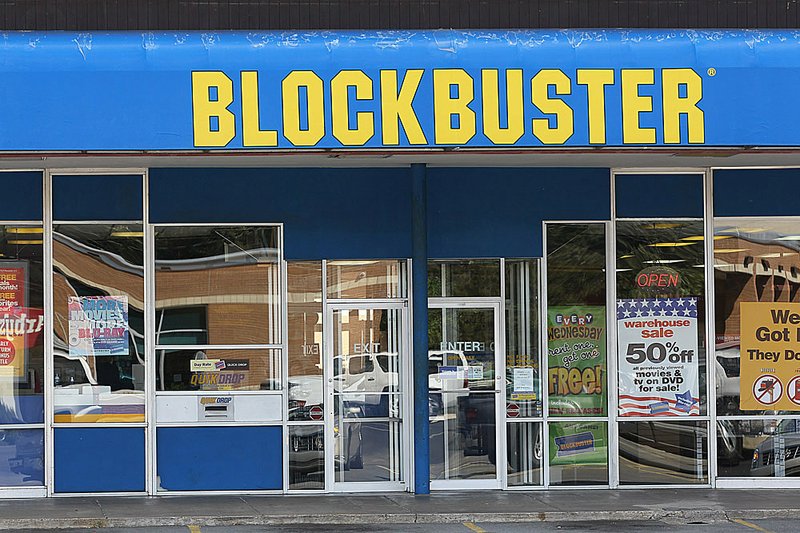LITTLE ROCK — Blockbuster Inc. filed for bankruptcy protection Thursday under a plan that lowers its nearly $1 billion debt and provides financing to reorganize a video-rental business that analysts say failed to adapt to competition from rivals such as Netflix Inc.
The Dallas-based company said all its U.S. operations, including 3,000 company-operated stores, about400 franchise stores, its DVD by-mail business, rental kiosks and digital businesses, will remain open. Rewards programs, coupons and gift cards will be honored.
In a news release, a manager of a Little Rock Blockbuster store said all franchise locations in central Arkansas are “unaffected by Blockbuster Inc.’s recent Chapter 11 filing.”
While it’s still the largest U.S. video-rental company and says it has 47 million customers around the world, Blockbuster’s business has been shrinking for years as customers moved to Netflix’s DVD bymail business and Redbox DVD rental kiosks.
Consumers also finally began to adopt a growing list of digital options that have threatened to make Blockbuster obsolete since the 1990s.
Netflix has 15 million bymail customers to Blockbuster’s 2.6 million. Redbox has more than 20,000 kiosks to Blockbuster’s 7,000.
“After a careful and thorough analysis, we determined that the process announced today provides the optimal path for recapitalizing our balance sheet and positioning Blockbuster for the future as we continue to transform our business model,” Chief Executive Officer Jim Keyes said in a statement.
It’s unclear whether Keyes will remain in charge.
Blockbuster, founded in 1985 by a Dallas software entrepreneur, was once a home entertainment powerhouse. It helped popularize videotape recorders and took off in 1987 after Waste Management Inc. founder Wayne Huizenga took control and began aggressively expanding and buying up competitors.
The company probably would have been in a far better position had it taken Netflix more seriously in 1999, when the upstart started taking DVD rental orders online and mailing the discs to people’s homes, analysts said.
Even when Netflix started to gain enough traction to go public in 2002, Blockbuster’s then-CEO John Antioco dismissed it as a niche service.
“The best analogy I can think of is that Netflix seemed like a buffet,” said analyst Michael Pachter of Wedbush Morgan Securities. “While you could see some people liking the idea of having all you can eat for one price, you would never imagine it turning into a major competitor to McDonald’s.”
Under the bankruptcy plan, which wipes out shareholders, Blockbuster’s new owners are its senior secured debt holders that include billionaire investor and former Blockbuster board member Carl Icahn.
Icahn resigned from Blockbuster’s board in January and proceeded to sell his Blockbuster stock through the summer. He had owned 26 million shares and was the company’s biggest individual shareholder. He started buying the stock when it was $10 a share. It is estimated that Icahn lost more than $200 million in his original Blockbuster investment.
About 80 percent of the company’s senior secured debt holders agreed to give Blockbuster $125 million in new financing and cut its more than $900 million in debt to about $100 million.
Blockbuster filed its Chapter 11 petitions with the U.S. Bankruptcy Court for the Southern District of New York. Its international operations and franchisees aren’t part of the filings.
“To preserve its three-decade long developed brand value, Blockbuster seeks a restructuring that permits a significant deleveraging of its business so that it can move forward at the digital clip at which its industry and competitors are currently running,” Jeffery Stegenga, the company’s restructuring officer, said in a court filing.
The 274-page filing calls for a confirmation plan approved by the court by March 15.
Blockbuster won court permission Thursday to draw $20 million of the $125 million loan that will let it operate while it reorganizes. U.S. Bankruptcy Judge Burton Lifland approved the loan at a hearing in Manhattan. Blockbuster said it will spend only $10 million before Monday.
Lifland also gave the company permission to continue paying employees.
CEO Keyes said the agreement from note holders to exchange their debt for new equity “is an important vote of confidence in Blockbuster.”
A group of individual shareholders who collectively said they owned more than25 percent of the company has been critical of Keyes and Blockbuster’s board.
“Jim Keyes is the main reason Blockbuster is in this position today due to his denial of being in a business model that did not work anymore,” said Niko Celentano, the group’s spokesman and a Brooklyn grocer. “If Jim Keyes would have seen the changes that were evolving in this industry in the past few years, Blockbuster would not have been in the courts today filing Chapter 11 bankruptcy.”
In an e-mail Thursday morning, Celentano said Keyes should resign.
While Blockbuster’s 3,000 stores will remain open for now, it’s planning to close additional unprofitable stores. It has closed more than 1,000 stores in the past year and could close 500 to 800 more in bankruptcy. It has continued to close stores over the summer. It last reported it had 3,425 U.S. stores and 2,383 international locations as of July 4.
The company has lost more than $4 billion since 2002, and suffered the embarrassment of being removed from the New York Stock Exchange. Leading up to the bankruptcy filing, Blockbuster’s market value had fallen to just $12 million, from $4 billion eight years ago.
Information for this article was contributed by Maria Halkias of The Dallas Morning News, Dawn McCarty, David McLaughlin, Linda Sandler and Tiffany Kary of Bloomberg News and Michael Liedtke and Mae Anderson of The Associated Press.
Front Section, Pages 1 on 09/24/2010
